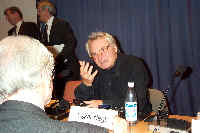 Pohjoismaisella kansansivistysliikkeellä on uusi tehtävä nopeasti muuttuneessa maailmassa, joka on sivilisaatiokriisin kourissa. On hyvä merkki, että EU:lla on nyt erityinen Gruntvig-ohjelma, joka ei ole pelkästään ihmisten varustamista kohtaamaan työelämänsä seuraava käännekohta tai kriisi. Aikuiskasvatuksella voidaan vastata laajasti siihen tarpeeseen, että maailmassa selviytyminen edellyttää yhä enemmän kykyä hahmottaa ylitsevyöryvää kehitystä itsenäisesti ja kriitiisesti. On omattava perustavanlaatuisia sosiaalisia taitoja, tilannetajua sekä hoksottomia (oivalluskykyä).
Pohjoismaisella kansansivistysliikkeellä on uusi tehtävä nopeasti muuttuneessa maailmassa, joka on sivilisaatiokriisin kourissa. On hyvä merkki, että EU:lla on nyt erityinen Gruntvig-ohjelma, joka ei ole pelkästään ihmisten varustamista kohtaamaan työelämänsä seuraava käännekohta tai kriisi. Aikuiskasvatuksella voidaan vastata laajasti siihen tarpeeseen, että maailmassa selviytyminen edellyttää yhä enemmän kykyä hahmottaa ylitsevyöryvää kehitystä itsenäisesti ja kriitiisesti. On omattava perustavanlaatuisia sosiaalisia taitoja, tilannetajua sekä hoksottomia (oivalluskykyä).
For the first time in modern history will and consciousness are used for bringing political, social and cultural unity to the European continent. It is neither self-evident nor a natural phenomenon. For 500 years this continent has been a theatre of bloody wars and harsh competition. Europe has now become one of the most amazing historical projects that are being constructed.
I will describe the five problematic issues in which political, social and cultural construction processes are needed. In the centre of these processes is the adult education. Because the crisis of today in the industrial societies of the West is not caused by one reason only. It is neither economy alone that is responsable for the crisis nor the social and cultural circumstances. I will therefore try to divide the crisis into separate working projects.
1)
In the last fifteen years the world has dramatically changed in the European context. Imperialism has disappeared without use of guns. Whole our imaginary world which was constructed on two poles with old, new and third worlds, resulted in irritations and disorder. The democratic socialists in the Western countries did not have difficulties in defining socialism; they could refer to the Soviet Union and Stalinism in order to state: this kind of Socialism we do not want! Also for the bourgeoise-democratic systems the Soviet imperialism was a kind of 'realism of exclusion'. Our European social systems became their foundation out of the belief that the West was not only freer but also succeeded better to guard the social rights. Ever since this reality of exclusion collapsed, the Western civil society is demanded to develop a new kind of self-understanding.
2)
It is the crisis of society based on work. It has taken 500 years for man to accept that his value, his feeling of self-value and his social recognition was bound to work. But the productivity of lively work has continuously increased. Production of richness does not necessarity need more human work. So the chronic unemployment of the masses in Europe is a central threat to the foundation of the civil society. How should the many 'left-over' persons be taken care of and kept politically calm continuously? We have experience from the 20th century that persons who have lost their value are easy targets for authoritarian and military leaders. This problem can only be solved in a European-wide framework, otherwise the costs will be shifted from one country to another. There is a danger that the big enterprises will not pay for the common good anymore, which in turn would cause the collapse of the social state.
3)
One crisis more is caused by the changing relations of the places where people are brought up in, family as a place for socialisation, school, society. Media as second reality replace the disability of the citizens to criticise and judge, and create rootlessness. Certain social virtues of sharing, compromising, individual strengh of judging have no permanent place anymore. The fragmented families with high rates of divorce do not contribute anymore to bring up children to solidarity. In addition, there is the problem of increasing poverty of children, also in the richest of the countries. This crisis can be worked out when it is seen in European-wide context.
4)
Technology that has an effect on people more and more includes integrity and value of human existence. Practically a human being can be put together anew through transplantations. These plantations of organs do keep man alive but also lead to a profound change of manhood. In addition, the entering of the science into the genetic structures is more and more concrete. As limits new norms of behavior are needed, as well as legal barriers. Also here the civil society needs European-wide perspectives.
5)
Democratic participation as crisis. Democracy is, as Aristotle defined it, the only political way of life that must be learned and that does not exist naturally. Therefore, we need an educational system of which the aim is to create an endogeneously guided human being. That kind of man has autonomous ability to judge, with a critical point of view, and with trustful relations. Political participation in the society is of central importance for civil society. Where people do not anymore recognise that society equals their matters, there is possibility for maliscious political and demagogical leaders. But what is needed is the ameliorating of close relations between people, not just trust in abstract institutions. Also here we need a European-wide project.
Out of all these points I see certain demands for education but which I will not go deeper into here. This crisis gives raw material for adult education in Europe. This is of enormous importance. For the more self-confident the European-wide identity, the more helpful and solidarian Europe can act towards other world regions that absolutely need support.
